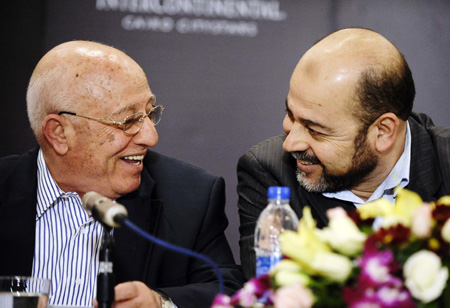"We (Palestinians) started a new chapter (to reach national) reconciliation and unity," said Qurei.
Describing Thursday when the talks was revived as "a historic day", Qurei said the committees will pave the way for a solution to various pending issues related to the Palestinian rift.
The first committee would be tasked of forming a national unity government, the second one building impartial security forces, the third one overhauling the Palestine Liberation Organization, the fourth one pushing forward the reconciliation and the last one preparing for legislative and presidential elections slated for January 2010.
 |
|
Ahmed Qurei (L), a senior Fatah leader and member of the Fatah delegation for the talks, and Moussa Abu Marzouk, Hamas politburo deputy chief and member of the group's delegation, talk in a press conference after an inter-Palestinian national unity dialogue held in Cairo, capital of Egypt, Feb. 26, 2009. The Palestinian factions attending the dialogue here on Thursday have agreed to work for the reconciliation among Palestinians.[Zhang Ning/Xinhua]
|
Hamas won the legislative elections in early 2006 and formed a government led by its leader Ismail Haneya, who was later sacked by Palestinian President Mahmoud Abbas.
Haneya, who has been hiding since Dec. 27 when the Gaza conflict broke out, said on Thursday that "the national dialogue (in Cairo) is a way for national salvage and it is not a political tactic," according to a statement carried by Palestinian Information Center, Hamas' official media outlet.
As for the prospect of elections and a new government, Qurei said "the train of unity that run today would continue in the right direction to arrive at what our people and nation are looking forward."